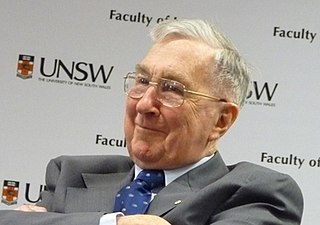
Sir Francis Gerard Brennan was an Australian lawyer and jurist who served as the 10th Chief Justice of Australia. As a judge in the High Court of Australia, he wrote the lead judgement on the Mabo decision, which gave rise to the Native Title Act.
Sir Ti-liang Yang, was a Hong Kong judge. He was the Chief Justice of Hong Kong from 1988 to 1996, the only ethnic Chinese person to hold this office during British colonial rule.

The West Bengal National University of Juridical Sciences is a National Law University (NLU) located in Bidhannagar, Kolkata, West Bengal, India. In 2023, it was ranked 4th among law colleges in India by National Institutional Ranking Framework and 2nd by India Today. It comes under the exclusive chancellorship and purview of the Chief Justice of India.
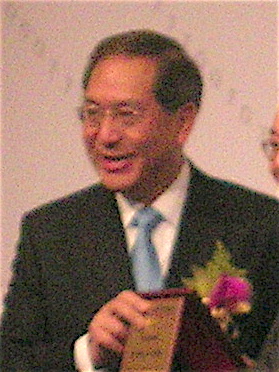
Arthur Li Kwok-cheung, GBM, GBS JP is a Hong Kong doctor and politician. He is currently member of the Executive Council of the Hong Kong Special Administrative Region and the chairman of the Council of the University of Hong Kong (HKU). He was Vice-Chancellor of the Chinese University of Hong Kong (CUHK) from 1996 to 2002 and Secretary for Education and Manpower from 2002 to 2007. Li’s dictatorial and ruthless leadership style led some to refer to him as "King Arthur" and even "the Tsar". He is the grandson of the co-founder of the Bank of East Asia, Li Koon-chun, and brother of its current chairman, David Li. He was awarded the Grand Bauhinia Medal (GBM) by the Hong Kong SAR Government in 2017.

The Hong Kong Bar Association (HKBA) is the professional regulatory body for barristers in Hong Kong. The Law Society of Hong Kong is the equivalent association for solicitors in Hong Kong.
The Postgraduate Certificate in Laws is an intensive one-year, full-time professional legal qualification programme in Hong Kong. It allows graduates to proceed to legal training in order to qualify to practice as either a barrister or a solicitor in Hong Kong. The "LL." of the abbreviation for the certificate is from the genitive plural legum. The programme is similar to the Legal Practice Course or the Bar Professional Training Course in England and Wales, or the Certificate in Legal Practice (Malaysia) in Malaysia which focuses heavily on practical and procedural issues in legal practice, unlike a first degree in law.

The Common Professional Examination/Postgraduate Diploma in Law (CPE/PGDL) is a postgraduate law course in England and Wales taken by non-law graduates wishing to become either a solicitor or barrister in England and Wales. It is being replaced by the Solicitors Qualifying Examination (SQE) which was introduced on 1 September 2021.
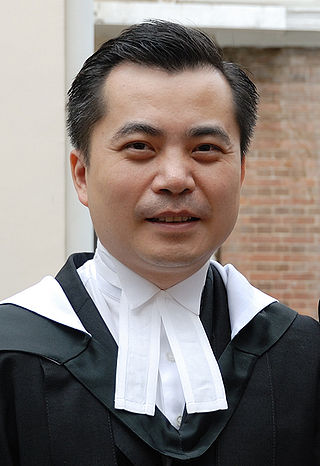
Wong Yan-lung, GBM, SC is a barrister in Hong Kong who served as the second Secretary for Justice of Hong Kong between 20 October 2005 and 30 June 2012.
The Hong Kong order of precedence is a nominal and symbolic hierarchy of important positions within the Government of Hong Kong. Administered by the government's Protocol Division, the hierarchy does not determine the order of succession for the office of Chief Executive, which is instead specified by the Basic Law of Hong Kong.
The Graduate Diploma in English and Hong Kong Law (GDEHKL) is a Hong Kong graduate diploma programme that allows students that did not take law as an undergraduate degree to "convert" to law, before going onto a professional qualification course and ultimately legal training.
The Chinese University of Hong Kong Faculty of Law is a law school in Hong Kong.
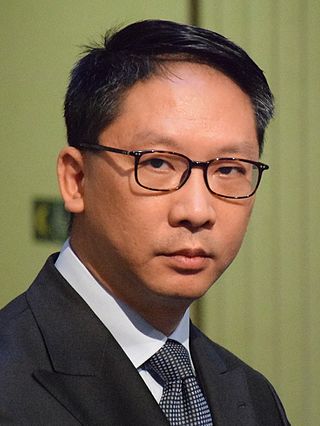
Rimsky Yuen Kwok-keung is a barrister who served as the third Secretary for Justice of Hong Kong from 2012 to 2018.

Johannes Chan Man-mun (陳文敏) SC (Hon) is an adjunct professor, former chair professor of law (–2021) and former dean of the faculty of law (2002–2014) at the University of Hong Kong. He specialises in human rights, constitutional and administrative law, and is the first and only academic silk ever appointed in Hong Kong. He is credited with transforming the University's Faculty of Law into one of the leading law schools in the world during his tenure as Dean.
Patrick Chan Siu-oi is a judge in Hong Kong. He currently serves as a Non-Permanent Judge of the Court of Final Appeal having previously been a Permanent Judge of that court.
Legal education in Hong Kong generally refers to the education of lawyers before entry into practice.
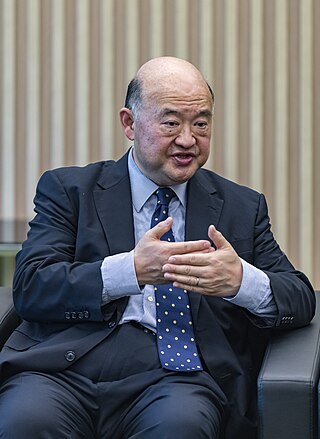
Geoffrey Ma Tao-li is a retired Hong Kong judge who served as the 2nd Chief Justice of the Hong Kong Court of Final Appeal—the court of last resort in Hong Kong. Between 2001 and 2010, he held various positions in the High Court of Hong Kong, including Chief Judge, Justice of Appeal, and Judge of the Court of First Instance. Before his judicial career, he was a barrister-at-law in private practice at Temple Chambers, and was qualified to practice in England and Wales, Hong Kong, Australia and Singapore.

Andrew Cheung Kui-nung is a Hong Kong judge who serves as the 3rd Chief Justice of the Court of Final Appeal. He previously served as a Permanent Judge of the same court. He was the 4th and longest-serving Chief Judge of the High Court.

The School of Law of City University of Hong Kong was founded in 1987, as the second law school in Hong Kong.
Temple Chambers is a set of barristers' chambers based in Admiralty, Hong Kong. It is widely considered to be one of the leading sets of chambers in Hong Kong given its high ratio of senior counsel to juniors, as well as a strong history of appointments to key judicial and government roles.











